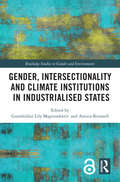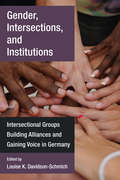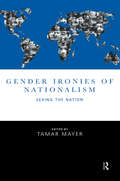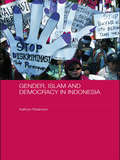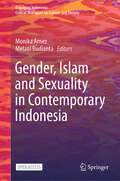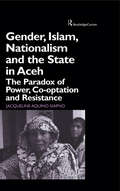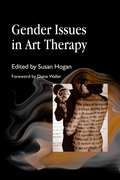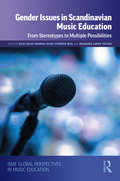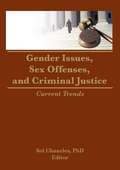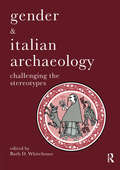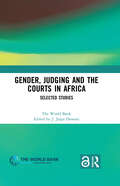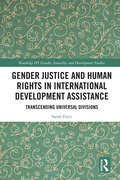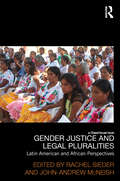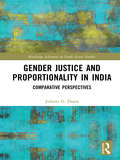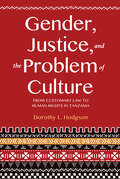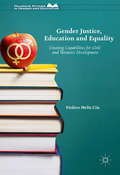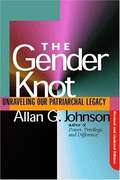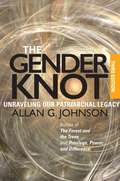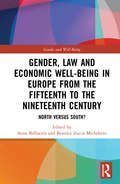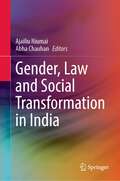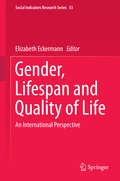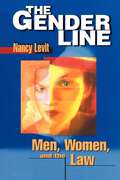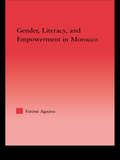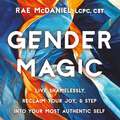- Table View
- List View
Gender, Intersectionality and Climate Institutions in Industrialised States (Routledge Studies in Gender and Environments)
by Gunnhildur Lily Magnusdottir and Annica KronsellThis book explores how climate institutions in industrialized countries work to further the recognition of social differences and integrate this understanding in climate policy making. With contributions from a range of expert scholars in the field, this volume investigates policy-making in climate institutions from the perspective of power as it relates to gender. It also considers other intersecting social factors at different levels of governance, from the global to the local level and extending into climate-relevant sectors. The authors argue that a focus on climate institutions is important since they not only develop strategies and policies, they also (re)produce power relations, promote specific norms and values, and distribute resources. The chapters throughout draw on examples from various institutions including national ministries, transport and waste management authorities, and local authorities, as well as the European Union and the UNFCCC regime. Overall, this book demonstrates how feminist institutionalist theory and intersectionality approaches can contribute to an increased understanding of power relations and social differences in climate policy-making and in climate-relevant sectors in industrialized states. In doing so, it highlights the challenges of path dependencies, but also reveals opportunities for advancing gender equality, equity, and social justice. Gender, Intersectionality and Climate Institutions in Industrialized States will be of great interest to students and scholars of climate politics, international relations, gender studies and policy studies.
Gender, Intersections, and Institutions: Intersectional Groups Building Alliances and Gaining Voice in Germany
by Louise K Davidson-SchmichGermany serves as a case study of when and how members of intersectional groups—individuals belonging to two or more disadvantaged social categories—capture the attention of policymakers, and what happens when they do. This edited volume identifies three venues through which intersectional groups are able to form alliances and generate policy discussions regarding their concerns. Original empirical case studies focus on a wide range of timely subjects, including the intersexed, gender and disability rights, lesbian parenting, women working in STEM fields, workers’ rights in feminized sectors, women in combat, and Muslim women and girls.
Gender Ironies of Nationalism: Sexing the Nation
by Tamar MayerThis book provides a unique social science reading on the construction of nation, gender and sexuality and on the interactions among them. It includes international case studies from Indonesia, Ireland, former Yugoslavia, Liberia, Sri Lanka, Australia, the USA, Turkey, China, India and the Caribbean.The contributors offer both the masculine and feminine perspective, exposing how nations are comprised of sexed bodies, and exploring the gender ironies of nationalism and how sexuality plays a key role in nation building and in sustaining national identity.The contributors conclude that control over access to the benefits of belonging to the nation is invariably gendered; nationalism becomes the language through which sexual control and repression is justified masculine prowess is expressed and exercised. Whilst it is men who claim the prerogatives of nation and nation building it is, for the most part, women who actually accept the obligation of nation and nation building.
Gender, Islam and Democracy in Indonesia (ASAA Women in Asia Series #6)
by Kathryn RobinsonThis book explores the relationship between gender, religion and political action in Indonesia, examining the patterns of gender orders that have prevailed in recent history, and demonstrating the different forms of social power this has afforded to women. It sets out the part played by women in the nationalist movement, and the role of the women’s movement in the structuring of the independent Indonesian state, the politics of the immediate post-independence period and the transition to the authoritarian New Order. It analyses in detail the gender relations of the New Order regime, focused around the unitary family form supposed by the family system expounded in the New Order ideology and the contradictory implications of the opening up of the economy to foreign capital and ideas, for gender relations. It examines the forms of political activism that were possible for the women’s movement under the New Order, and the role it played in the fall of Suharto and the transition to democracy. The relationship between Islam and women in Indonesia is also addressed, with particular focus on the way in which Islam became a critical focus for political dissent in the late New Order period. Overall, this book provides a thorough investigation of the relationship between gender, religion and democracy in Indonesia, and is a vital resource for students of gender studies and Indonesian affairs.
Gender, Islam and Sexuality in Contemporary Indonesia (Engaging Indonesia)
by Monika Arnez Melani BudiantaThis Open Access book explores the complex interplay between gender, Islam and sexuality in Indonesia, the country with the world's largest Muslim population. The authors offer a fresh look at the tensions between the local and the global through a wide range of cultural expressions and productions, including fashion, Islamic dating, popular literature, and videos on YouTube. The book is grouped around three core themes: sexuality and violence, halal lifestyle, and shame and self-determination. The first section unpacks how activists and progressive religious scholars have argued for the need for the Sexual Violence Bill and it examines the ambivalence between criminalisation and care towards LGBTQ+ people. In the second, the authors bring new insights into how local expressions of Islam, gender and sexuality are negotiated in an increasingly globalised world. The contributions on the third theme tackle gender roles and mobility in culturally diverse regions such as Hong Kong,Taiwan, Singapore, the US, and Indonesia. "The volume is a must-read for anyone wanting to get up to speed on changes in Indonesia's gender, sexuality and Islamic landscape." - Professor Sharyn Graham Davies, Director of the Herb Feith Indonesia Engagement Centre, Monash University, Australia "A showcase of excellent research, this book is of appeal to Indonesian studies scholars, and to readers in the field of Asian cultural studies. It is also of relevance to the field of Asian gender and sexuality studies, and to scholars in Islamic studies." - Professor Pamela Nilan, University of Newcastle, Australia
Gender, Islam, Nationalism and the State in Aceh: The Paradox of Power, Co-optation and Resistance
by Jaqueline Aquino SiapnoThis book sets out to open up the space for interpretation of history and politics in Aceh which is now in a state of armed rebellion against the Indonesian government. It lays out a groundwork for analysing how female agency is constituted in Aceh, in a complex interplay of indigenous matrifocality, Islamic belief and practices, state terror, and political violence. Analysts of the current conflict in Aceh have tended to focus on present events. Siapno provides a historical analysis of power, co-optation, and resistance in Aceh and links it to broader comparative studies of gender, Islam, and the state in Muslim communities throughout the world.
Gender Issues in Art Therapy
by Nancy Slater Marian Liebmann Susan HoganArt therapy enables the client and therapist to explore issues that may ordinarily be difficult to articulate in words; one such issue is the complexity of gender, which can be a subject of therapy in a range of ways. Gender identity is at the heart of our self-understanding. The contributors to this book cover such topics as internalised homophobia in both therapist and client, art and pregnancy, art therapy with women only and men-only groups, feminist art therapy, gay and lesbian issues, and gender stereotypes. These wide-ranging papers cover both theoretical and practical topics, giving clinical examples and instances of clients' artwork in illustration. The contributors, all established art therapists, bring a wide range of experiences and perspectives to the topic of gender in art therapy. Professionals and students in this field will find the insights contained in this book both fascinating and valuable.
Gender Issues in Scandinavian Music Education: From Stereotypes to Multiple Possibilities (ISME Series in Music Education)
by Silje Valde OnsrudGender Issues in Scandinavian Music Education: From Stereotypes to Multiple Possibilities introduces much-needed updates to research and teaching philosophies that envision new ways of considering gender diversity in music education. This volume of essays by Scandinavian contributors looks beyond the dominant Anglo-American lens while confronting a universal need to resist and rethink the gender stereotypes that limit a young person’s musical development. Addressing issues at all levels of music education—from primary and secondary schools to conservatories and universities— topics discussed include: the intersection of social class, sexual orientation, and teachers’ beliefs; gender performance in the music classroom and its effects on genre and instrument choice; hierarchical inequalities reinforced by power and prestige structures; strategies to fulfill curricular aims for equality and justice that meet the diversity of the classroom; and much more! Representing a commitment to developing new practices in music education that subvert gender norms and challenge heteronormativity, Gender Issues in Scandinavian Music Education fills a growing need to broaden the scope of how gender and equality are situated in music education—in Scandinavia and beyond.
Gender Issues, Sex Offenses, and Criminal Justice: Current Trends
by Janine ChanelesHere is a powerful look at gender issues in the criminal justice system, particularly as gender is related to sex offenses and the system’s response to those offenses. Experts examine inmate sexual aggression, gender disparity in bail setting, racial patterns of rape, the female offender’s adjustment to prison life, the psychological profile of female first offenders, and the self-image of juvenile prostitutes.
Gender & Italian Archaeology: Challenging the Stereotypes (UCL Institute of Archaeology Publications #Vol. 7)
by Ruth D. WhitehouseThe original research papers in this volume represent the first attempt to address issues of gender in the archaeology of Italy. Ranging from prehistoric to early classic periods, the authors address theoretical and methodological issues, as well as present a series of cases using both traditional and feminist research methods.
Gender, Judging and the Courts in Africa: Selected Studies (Routledge Studies on Gender and Sexuality in Africa)
by J. Jarpa DawuniWomen judges are playing increasingly prominent roles in many African judiciaries, yet there remains very little comparative research on the subject. Drawing on extensive cross-national data and theoretical and empirical analysis, this book provides a timely and broad-ranging assessment of gender and judging in African judiciaries. Employing different theoretical approaches, the book investigates how women have fared within domestic African judiciaries as both actors and litigants. It explores how women negotiate multiple hierarchies to access the judiciary, and how gender-related issues are handled in courts. The chapters in the book provide policy, theoretical and practical prescriptions to the challenges identified, and offer recommendations for the future directions of gender and judging in the post-COVID-19 era, including the role of technology, artificial intelligence, social media, and institutional transformations that can help promote women’s rights. Bringing together specific cases from Kenya, Uganda, Ghana, Nigeria, Zambia, Tanzania, and South Africa and regional bodies such as ECOWAS and the African Commission on Human and Peoples’ Rights, and covering a broad range of thematic reflections, this book will be of interest to scholars, students, and practitioners of African law, judicial politics, judicial training, and gender studies. It will also be useful to bilateral and multilateral donor institutions financing gender-sensitive judicial reform programs, particularly in Africa.
Gender Justice and Human Rights in International Development Assistance: Transcending Universal Divisions (Routledge ISS Gender, Sexuality and Development Studies)
by Sarah FortiGender Justice and Human Rights in International Development Assistance provides a critical analysis of how frameworks of gender equality play out in the field of international development assistance, at theoretical, international legislative and policy levels, donor and national policy levels and programme levels. If current dominant theoretical perspectives are not interrogated, the consequences could be that gender inequalities and injustices are inadequately addressed, or that opportunities are missed to impact on poverty reduction and on transformative gender changes. Through a renewed interpretation of gender equality in IDA, the book aims to show the way towards a more effective response to gender inequalities and injustices faced by women in developing countries. Drawing on 20 years of experience working with IDA policies and programming across three continents, this book makes an important contribution to the active and dynamic field of critical feminism, as well as providing practical illustrations on how such critical thinking might contribute to gender transformational changes. Gender Justice and Human Rights in International Development Assistance will be important reading for scholars and upper level students working in the fields of gender equality, human rights, development assistance, foreign affairs, international law, and international relations.
Gender Justice and Legal Pluralities: Latin American and African Perspectives (Law, Development and Globalization)
by Rachel Sieder John-Andrew McNeishGender Justice and Legal Pluralities: Latin American and African Perspectives examines the relationship between legal pluralities and the prospects for greater gender justice in developing countries. Rather than asking whether legal pluralities are ‘good’ or ‘bad’ for women, the starting point of this volume is that legal pluralities are a social fact. Adopting a more anthropological approach to the issues of gender justice and women’s rights, it analyzes how gendered rights claims are made and responded to within a range of different cultural, social, economic and political contexts. By examining the different ways in which legal norms, instruments and discourses are being used to challenge or reinforce gendered forms of exclusion, contributing authors generate new knowledge about the dynamics at play between the contemporary contexts of legal pluralities and the struggles for gender justice. Any consideration of this relationship must, it is concluded, be located within a broader, historically informed analysis of regimes of governance.
Gender Justice and Proportionality in India: Comparative Perspectives (Routledge Advances in South Asian Studies)
by Juliette Gregory DuaraFor a judiciary in a democracy, dispensing justice is not only about doing justice, but also about showing that justice is being done; it is about giving reasons and creating a "culture of justification". The question becomes how to nurture such a culture. A number of liberal democratic jurisdictions have answered this question in part with the adoption of the multi-step method of evaluating the constitutionality of legislative infringements on fundamental rights widely known as Proportionality Analysis. Under Proportionality Analysis courts must engage in a structured process of reasoning. This book deals with Gender Justice and Proportionality Analysis in India. The author argues that the Supreme Court of India should consider adopting Proportionality Analysis for the adjudication of the fundamental right to sex equality in Indian courts. The book includes an analysis of Canadian and South African Proportionality Analysis and makes some suggestions on how an Indian Proportionality Analysis could be generated using this comparative investigation. Additionally, the book proposes ways of applying the effects of socio-political context on doctrine, as well as doctrine’s interpretive impact on adjudicated outcomes for gender, thus making a contribution to feminist jurisprudence. Finally, the author analyses Indian gender equality jurisprudence, demonstrating the inadequacies of the current doctrinal framework for achieving the goal of substantive gender equality and suggesting ways in which an Indian Proportionality Analysis might be fashioned to address these inadequacies. A novel examination of the gender situation in India in comparative perspective, this book will be of interest to academics in the field of Gender Studies, Asian and Comparative Law and South Asian studies.
Gender, Justice, and the Problem of Culture: From Customary Law to Human Rights in Tanzania
by Dorothy L. HodgsonWhen, where, why, and by whom is law used to force desired social change in the name of justice? Why has culture come to be seen as inherently oppressive to women? In this finely crafted book, Dorothy L. Hodgson examines the history of legal ideas and institutions in Tanzania – from customary law to human rights – as specific forms of justice that often reflect elite ideas about gender, culture, and social change. Drawing on evidence from Maasai communities, she explores how the legacies of colonial law-making continue to influence contemporary efforts to create laws, codify marriage, criminalize FGM, and contest land grabs by state officials. Despite the easy dismissal by elites of the priorities and perspectives of grassroots women, she shows how Maasai women have always had powerful ways to confront and challenge injustice, express their priorities, and reveal the limits of rights-based legal ideals.
Gender Justice, Education and Equality
by Firdevs Melis CinThis book reframes gender and education issues from a feminist and capabilities perspective through a multi-generational study of women as teachers. It explores how different understandings of gender, equality and education generate a variety of approaches with which to pursue gender equality in education. Through employing the capabilities approach in a critical and innovative way to question justice, agency and well-being and also to evaluate valued functionings and capabilities, freedoms and lack of opportunities in women's lives in Turkey it highlights the need for constructing a gender-just society. The book takes a closer look at these women's memories, in order to understand how gender roles were created, negotiated and contested, and how the transition to modern ways of socialising and existing was shaped and women's emancipation was guided by women teachers as social actors, rather than as passive onlookers or oppressed individuals. It provides important insights and critical evidence to be used in the planning and implementation of education and social/gender policies.
The Gender Knot: Unraveling Our Patriarchal Legacy
by Allan G. JohnsonThe book describes in detail the patriarchal system under which societies exist and suggests ways of beginning to unravel that knot.
The Gender Knot: Unraveling Our Patriarchal Legacy; Third Edition
by Allan G. JohnsonNew Third Edition! The Gender Knot, Allan Johnson's response to the pain and confusion that men and women experience by living with gender inequality, explains what patriarchy is and isn't, how it works, and what gets in the way of understanding and doing something about it. Johnson's simple yet powerful approach avoids the paralyzing trap of guilt, blame, anger, and defensive denial that often results from conversations about gender. This edition features: • Updated references, data, resources, and examples, especially in relation to issues of sexual orientation and gender identity (e.g., gay marriage, transgender/cisgender) • A glossary of terms • A new chapter, "What Changes and What Does Not: Manhood and Violence," that provides an extended analysis of the causes of men's violence as a patriarchal phenomenon
The Gender Knot: Revised and Updated Edition
by Johnson Allan G.The Gender Knot, Allan Johnson's response to the pain and confusion that men and women experience by living with gender inequality, explains what patriarchy is (and isn't), how it works, and what gets in the way of understanding and doing something about it. Johnson's simple yet powerful approach avoids the paralyzing trap of guilt, blame, anger, and defensive denial that often result from conversations about gender. He shows how we all participate in an oppressive system we didn't create and how each of us can contribute towards its dissolution. He argues persuasively that something much better is possible and that our individual choices matter more than we can ever know.
Gender, Law and Economic Well-Being in Europe from the Fifteenth to the Nineteenth Century: North versus South? (Gender and Well-Being)
by Anna Bellavitis Beatrice Zucca MichelettoThis book offers a comparative perspective on Northern and Southern European laws and customs concerning women’s property and economic rights. By focusing on both Northern and Southern European societies, these studies analyse the consequences of different juridical frameworks and norms on the development of the economic roles of men and women. This volume is divided into three parts. The first, Laws, presents general outlines related to some European regions; the second, Family strategies or marital economies?, questions the potential conflict between the economic interests of the married couple and those of the lineage within the nobility; finally, the third part of the book, Inside the urban economy, focuses on economic and work activities of middle and lower classes in the urban environment. The assorted and rich panorama offered by the history of the legislation on women’s economic rights shows that similarities and differences run through Europe in such a way that the North/South model looks very stereotyped. While this approach calls into question classical geographical and cultural maps and well-established chronologies, it encourages a reconsideration of European history according to a cross-boundaries perspective. By drawing on a wide range of social, economic and cultural European contexts, from the late medieval to early modern age to the nineteenth century, and including the middle and lower classes (especially artisans, merchants and traders) as well as the economic practices and norms of the upper middle class and aristocracy, this book will be of interest to economic and social historians, sociologists of health, gender and sexuality, and economists.
Gender, Law and Social Transformation in India
by Ajailiu Niumai Abha ChauhanThis book provides deep insights into the wide-ranging issues linked to gender, law, and social transformation in India. It focuses on women-centered laws as well as the violence of unequal and discriminatory social order. It emphasizes violence and the neutrality of laws that sustain the status quo and perpetuate the stereotypical notions related to women’s condition. Based on the first-hand experience of laws and their nuanced understanding, the essays highlight the rules associated with the private and the public domains. The chapters in the volume analyze various statutes and their enactment related to domestic violence, dowry crimes, sexual abuse at home as well as sexual harassment at the workplace, child marriages, education, property rights, trafficking, prostitution, ‘honor’ killings, and armed conflict. The book is essential to the academics and researchers in the disciplines of social sciences, gender studies, law, and the government and policy-makers for making meaningful interventions.
Gender, Lifespan and Quality of Life
by Elizabeth EckermannThis publication addresses the gender dimensions of people's lived experience and emphasizes how gender relationships differentially impact on women's and girls' as well as men's and boys' subjective well-being across the lifespan. It therefore fills a significant gap in the literature on quality of life and subjective well-being. The book brings together research which compares female's and male's subjective experiences of well-being at various life stages from a variety of countries and regions, particularly focusing on women's subjective well-being. Sex-disaggregation of data on objective conditions of quality of life is now routinely undertaken in many countries of the world. However, despite the burgeoning of objective data on sex differences in life conditions across the world, very little gender analysis is carried out to explain fully such difference and there is still a serious dearth of data on gender differences in subjective experiences of quality of life and well-being. This publication will assist researchers, teachers, service providers and policy makers in filling some of the gaps in currently available literature on the nexus between age and gender in producing differential experiences of subjective wellbeing.
The Gender Line: Men, Women, and the Law (Critical America #78)
by Nancy LevitDespite tremendous advances in civil rights, we live in a world where the sexes remain sharply segregated from birth to death: in names, clothing, social groupings, and possessions; in occupations, civic association, and domestic roles. Gender separatism, so pervasive as to be almost invisible, permeates the fabric of our daily social routines. Preferring a notion of gender that is fluid and contextual, and denying that separatism is inevitable, Nancy Levit dismantles the myths of gender essentialism Drawing on a wealth of interdisciplinary data regarding the biological and cultural origins of sex differences, Levit provides a fresh perspective on gendered behaviors and argues the need for careful cultivation of new relations between the sexes. With its focus particularly on men, The Gender Line offers an insightful overview of the construction of gender and the damaging effects of its stereotypes. Levit analyzes the ways in which law legitimizes the social segregation of the sexes through legal decisions regarding custody, employment, education, sexual harassment, and criminal law. In so doing, she illustrates the ways in which men's and women's oppressions are intertwined and how law molds the very definition of masculinity. Applying feminist methodology to the doctrine of feminism itself, Levit artfully demonstrates that gender separatism infects even our contemporary views of feminism. Levit asks questions that have been too long been unspoken--those that lie at the core of the feminist project, yet threaten its very foundations. Revealing masculinity as both a privileged and a victimized condition, she calls for a step forward, past the bounds of contemporary feminism and its conflicts, toward a more egalitarian and inclusive feminism. This brand of feminism would reshape traditional masculinity, invite men into feminist dialogue, and claim men as political allies.
Gender, Literacy, and Empowerment in Morocco (Middle East Studies: History, Politics & Law)
by Fatima AgnaouThis book's concept concerns the positive correlation between literacy and women's development and empowerment in developing countries.
Gender Magic: Live Shamelessly, Reclaim Your Joy, and Step into Your Most Authentic Self
by Rae McDaniel'Rae McDaniel is a leader in their generation, matching compassion with clear-sighted vision for a sex-positive future' Emily Nagoski, PhD, author of Come As You Are and BurnoutTaking everything they know from more than a decade of working with the queer and trans community, their personal journey of gender exploration, and clinical best practices, licensed therapist, coach and speaker Rae McDaniel created the Gender Freedom Model. A uniquely supportive narrative for gender exploration and transition grounded in queer joy, their nine-pillar model has helped thousands of transgender and nonbinary individuals explore gender through play, pleasure and freedom. And now, it can help you too.Whether you're transgender, non-binary, cisgender or still exploring, this compassionate and practical guide will help you experience your gender in new, expansive ways by teaching:· How to move from anxiety, self-doubt, and fear to a confident, proactive state of mind.· How to navigate discomfort and celebrate your inherent worth as you develop genuine self-love.· How to design relationships, community and a sex life that lights you up.· Practical tools to align your gender identity and expression with your most authentic self through play, pleasure and possibility. Brimming with warmth, celebration and practical advice, Gender Magic is essential reading for anyone who yearns to step into their fullest self and imagine a life beyond gender binaries. Because you - yes YOU - are magic.
